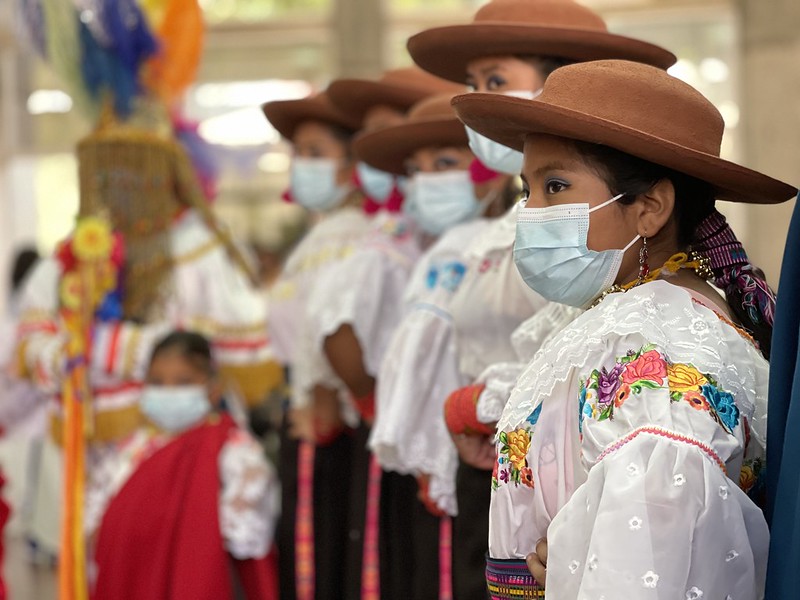Ecuador embraces gender transformative approaches for Zero Hunger
14 December 2021

The Government of Ecuador and the United Nations Rome-based Agencies (RBAs) – FAO, IFAD and WFP – have officially launched the Joint Programme on Gender Transformative Approaches for Food Security and Nutrition (JP GTA) in Ecuador, where the three agencies will implement innovative approaches to address the root causes of gender inequalities in collaboration with and through financial support from the European Union.
The launch took place in a ceremony in Quito on 1 December 2021 in occasion of the 16 Days of Activism against Gender-Based Violence campaign – which is annually celebrated between 25 November and 10 December. The event aimed at promoting intersectoral and inter-institutional articulation and coordination for food security, improved nutrition and sustainable agriculture.
With around USD 1 million for its implementation in Ecuador, the Joint Programme will carry out a series of interventions involving individuals and their families and communities as well as institutional and policy engagement in line with the country’s National Agricultural Strategy for Rural Women (ENAMR).
The event counted on the participation of various local government authorities as well as women leaders of different farmers’ organizations from across Ecuador, symbolizing how gender equality in the context of food security and nutrition goes hand in hand with an increased participation of rural women in decision-making processes and their leadership in their organizations.
During the high-level event, representatives of the three RBAs mentioned the commitment from their agencies to apply various methods, both practical and theoretical, that help raise awareness about the persisting gender gaps negatively impacting on the Ecuadorian society.
“This project that is developed in the provinces of Manabí and Imbabura, will allow, through coordinated work with the Ministry of Agriculture and Livestock and local governments, to promote strategies to address the root causes of gender inequality in the agri-food sector, fostering transformative change processes towards gender equality and the empowerment of women”, said Agustín Zimmermann, FAO Representative in Ecuador, in his speech at the event.
In turn, Fabrizio Bresciani, Lead Regional Economist for IFAD’s Latin American and Caribbean Division, highlighted the recognition that women often suffer multiple and interrelated forms of discrimination and that the JP GTA seeks to eliminate structural barriers to gender equality while challenging the distribution of resources and the allocation of roles and responsibilities between men and women through systems that promote more equitable gender relations in households, communities and organizations.
During his intervention, Matteo Perrone, WFP Country Director, applauded the important field work carried out in the provinces of Manabí and Imbabura under the JP GTA. He also said that these initiatives facilitate dialogue, trust and behaviour change at multiple levels – individual, family, community and institutional and systemic –, using participatory and experimental learning methodologies, explicitly considering men and boys as agents of change and promoters of gender equality.
Ecuador’s Minister of Agriculture and Livestock, Pedro Álava, pointed out that gender violence is a major problem the Ecuadorian society faces, and that it is everyone's duty to change that story. "We cannot continue to allow six out of ten women to suffer some type of mistreatment, even less that femicides continue to exist in Ecuador." He added that actions to prevent violence against women should be part of daily life and living together and that President Guillermo Lasso has commissioned the fight against gender-based violence as a State Policy, based on three axes: “Ecuador’s free of violence; Ecuador of equity; and Ecuador of encounters. "
Several representatives of farmers’ organizations and around 100 farmers participated in the event. Leaders such as Rosa Castañeda and Laura Perachimba thanked the support received from FAO, IFAD and WFP as part of the Comunidades de Aprendizaje (Learning Communities) dedicated to advance farmers’ agricultural skills jointly with the Ministry of Agriculture and Livestock. Both were part of a training process for promoters in Imbabura, gaining strength in their personal life, as it has allowed them to overcome situations of violence of which they had been victims. They also highlighted the importance of continuing to participate in these capacity-building spaces to learn about new agricultural techniques, and thus improving their food and nutrition systems.
The intervention of each of the leaders motivated the attendees to work in processes to promote gender equality and share experiences in relation to cases of discrimination that they have been victims. Among the topics addressed at this event, guidelines on access to financing for rural women, technical assistance and access to markets were included.
Prior to the national launch in the capital, the JP GTA had been officially launched in the Tosagua canton, in the province of Manabí, where the Joint Programme will be implemented. Officials representing the three RBAs and local authorities participated in the event on 15 October, the International Day of Rural Women.
To learn more:
- JP GTA website: https://www.fao.org/joint-programme-gender-transformative-approaches/
- JP GTA flyer (in English): https://www.fao.org/publications/card/es/c/CB7065EN
- JP GTA flyer (in Spanish): https://www.fao.org/publications/card/es/c/CB7065ES
Contacts:
- Hajnalka Petrics, Global Coordinator of the JP GTA: [email protected]
- JP GTA: [email protected]




